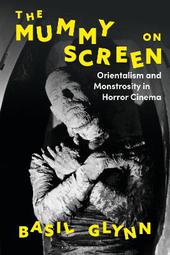
|
The Mummy on Screen: Orientalism and Monstrosity in Horror Cinema
Paperback / softback
Main Details
| Title |
The Mummy on Screen: Orientalism and Monstrosity in Horror Cinema
|
| Authors and Contributors |
By (author) Dr Basil Glynn
|
| Physical Properties |
| Format:Paperback / softback | | Pages:216 | | Dimensions(mm): Height 234,Width 156 |
|
| Category/Genre | Film theory and criticism
Asian and Middle Eastern history |
|---|
| ISBN/Barcode |
9781350194830
|
| Classifications | Dewey:791.43675 |
|---|
| Audience | | Tertiary Education (US: College) | |
|---|
| Illustrations |
15 bw illus
|
|
Publishing Details |
| Publisher |
Bloomsbury Publishing PLC
|
| Imprint |
Bloomsbury Academic
|
| Publication Date |
17 June 2021 |
| Publication Country |
United Kingdom
|
Description
The Mummy is one of the most recognizable figures in horror and is as established in the popular imagination as virtually any other monster, yet the Mummy on screen has until now remained a largely overlooked figure in critical analysis of the cinema. In this compelling new study, Basil Glynn explores the history of the Mummy film, uncovering lost and half-forgotten movies along the way, revealing the cinematic Mummy to be an astonishingly diverse and protean figure with a myriad of on-screen incarnations. In the course of investigating the enduring appeal of this most 'Oriental' of monsters, Glynn traces the Mummy's development on screen from its roots in popular culture and silent cinema, through Universal Studios' Mummy movies of the 1930s and 40s, to Hammer Horror's re-imagining of the figure in the 1950s, and beyond.
Author Biography
Basil Glynn is Senior Lecturer in Film and Television at Middlesex University, UK. His publications have explored a variety of film and television topics, notably television body horror and Asian transnational drama. He is the co-editor of the collection Television, Sex and Society: Analysing Contemporary Representations (Bloomsbury, 2012).
ReviewsThe mummy has long been neglected in horror criticism as a stiff and lifeless movie monster. But The Mummy on Screen finds a beating heart beneath the bandages. With exhaustive research and deft analysis, Basil Glynn lifts the shroud on the mummy and finds a fascinating and malleable monster whose mute body nonetheless speaks volumes about the Orientalist imagination. -- Andrew Scahill, Assistant Professor of English, University of Colorado Denver, USA If the Mummy has enjoyed considerably less critical attention or regard than its fellow movie undead, Basil Glynn rectifies that neglect in this persuasive reappraisal, tracing the beat of the cloth-wrapped feet in an authoritative and illuminating study of an enduring and deceptively versatile movie monster. -- Leon Hunt, Senior Lecturer in Film and TV Studies, Brunel University, UK Glynn not only shows us the origins of the shambling terror ... he takes us on an intellectually thrilling tour of the orientalist assumptions western audiences bring to the fictional mummy. Glynn will make you wonder why you ever cared so much about zombies and vampires in this accessible and brilliant examination of a truly terrifying monster that, until now, has never been given its due. Beware the mummy's curse! But read this book anyway. -- W. Scott Poole, Professor of History, College of Charleston, USA and author of Monsters in America and Wasteland: The Great War and the Origins of Modern Horror Glynn's observation that the Mummy has 'stalked . . . its way through the movies, largely unappreciated by critics, academics and cultural commentators' is an astute, if unfortunate one. Just as the Mummy is often without voice in the cinema, the same may largely be said of its presence in academic literature. Glynn's book isn't just welcome: it's essential. The Mummy, as Glynn points out, is perhaps the cinema's most lucrative yet (paradoxically) unappreciated teratological figure. The Mummy on Screen's legibility and wealth of research will make it indispensably useful. Undergraduate students will love it-graduate students will appreciate its accessibility; professors will wish they had written it. -- John Edgar Browning, Georgia Institute of Technology, author and editor of Zombie Talk: Culture, History, Politics, The Forgotten Writings of Bram Stoker, and Dracula in Visual Media The time has come to understand and embrace the Mummy's ongoing cultural relevance. Glynn unwraps the archetypal Mummy's relentless trajectory from ancient artefact to modern attraction! -- Victoria McCollum, Lecturer in Cinematic Arts, Ulster University, Northern Ireland
|